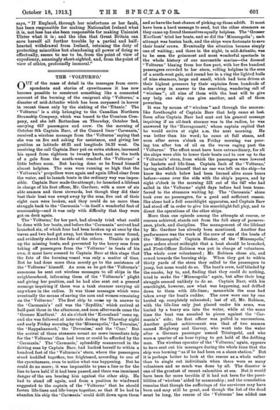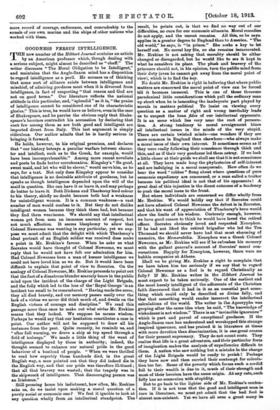THE VOLTURNO.'
OUT of the mass of detail in the messages from corre- spondents and stories of eyewitnesses it has now become possible to construct something like a connected account of the burning of the emigrant ship 'Volturno,' a disaster of mid-Atlantic which has been surpassed in horror in recent times only by the sinking of the Titanic.' The Volturno' is a ship belonging to the Canadian Northern Steamship Company, which was leased to the Uranium Com- pany, and she left Rotterdam on Thursday, October 2nd, carrying 657 passengers and crew. On the morning of October 9th Captain Barr, of the Cunard liner Ca.rmania,' received a wireless message from the 'Volturno' saying that she was on fire and asking for assistance, and giving her position as latitude 48.25 and longitude 34.33 west. On receiving the call Captain Barr put on extra stokers, increased his speed from eighteen to twenty knots, and in the teeth of a gale from the south-west reached the Volturno' a little before noon. But having done so he found himself almost helpless. The seas were running so high that the Volturno's ' propellers were again and again lifted clear from the water, and. to launch boats in the ordinary way was impos- sible. Captain Barr made the attempt; he launched a lifeboat in charge of his first officer, Mr. Gardner, with a crew of six able seamen and three stewards, but though they did their best their boat was swept away by the seas, five out of their eight oars were broken, and they could do no more than struggle back to the Carmania '—in itself a wonderful feat of seamanship—and it was only with difficulty that they were got on deck again.
The Volturno,' for her part, had already tried what could be done with her boats, and before the-'Carmania' arrived had launched six, of which four had been broken up at once by the waves and two had got away, but these two were never found, and evidently shared the fate of the others. Unable to pick up the missing boats, and prevented by the heavy seas from taking off passengers from the 'Volturno' in boats of his own, it must have seemed to Captain Barr at this stage that the fate of the burning vessel was only a matter of time. But he had done more than merely go to the assistance of the 'Volturno' himself. As soon as he got the Volturno's' summons he sent out wireless messages to all ships in the neighbourhood, informing them of the Volturno's ' plight and giving her position, and he had also sent out a general message inquiring if there was a tank steamer carrying oil anywhere in the radius. It was these messages which were eventually the means of saving the men and women remaining on the Volturno.' The first ship to come up in answer to the Carmania's ' call was the Seydlitz,' which arrived at half-past three in the afternoon, and soon afterwards came the Grosser Kurfiint.' At six o'clock the Kroonland ' came up, and she was followed at intervals during the Thursday night and early Friday morning by the 'Minneapolis,' 'La Touraine,' the 'Rappahannock,' the 'Devonian,' and the Czar.' But the arrival of these steamers meant no mere immediate help for the 'Volturno' than had been or could be afforded by the Carmania.' The Carmania,' splendidly rnanceuvred in the driving seas by Captain Barr, had backed herself to within a hundred feet of the Volturno's ' stern, where the passengers stood huddled together, too frightened, according to one of the eyewitnesses, even to notice what was happening. But he could do no more ; it was impossible to pass a line or for the line to have held if it had been passed, and there was imminent danger of the sea bearing him against the other ship. He had to stand off again, and from a position to windward suggested to the captain of the 'Volturno' that he should fasten life-lines and life-buoys together, so that if he had to abandon his ship the Carntania' could drift down upon them and so have the best chance of picking up those adrift. It must have been a hard message to send, but the other steamers as they came up found themselves equally helpless. The Grosser Kurfiirst' tried her boats, and so did the 'Minneapolis ' ; each attempt was beaten back, and the ships were fortunate to save their boats' crews. Eventually the situation became simply one of waiting; and there in the night, in mid-Atlantic, was to be seen the grimmest and most wonderful spectacle in the whole history of our mercantile marine—the doomed 'Volturno' blazing from her fore part, with her five hundred passengers crowded to her stern, rolling helpless in the seas of a south-west gale, and round her in a ring the lighted hulls of nine steamers, large and small, which had been driven at their highest pressure by their captains from hundreds of miles away in answer to the searching, wandering call of " wireless "; all nine of them with the best will to give any help one ship can give another, and all of them powerless.
It was by means of " wireless " and through the seaman- like forethought of Captain Barr that help came at last. Soon after Captain Barr had sent out his general message inquiring if an oil-tank steamer was in the radius, he was answered by the 'Narragansett,' whose captain replied that he would arrive at eight a.m. the next morning. He was better than his word ; he came at full steam, and soon after seven o'clock on Friday morning was pour- ing ton after ton of oil on the waves raging past the Volturno.' The effect must have been extraordinary, for all the ships were able to lower their boats and to row up to the Volturno's ' stern, from which the passengers were lowered by baskets and life-lines. Captain Inch of the 'Volturno,' having satisfied himself that no one was left on the ship—he knew the watch below had been burned alive some hours before—came over the side with the ship's papers, and by eight o'clock in the morning 521 out of the 647 who had sailed in the 'Volturno' eight days before had been trans- ferred to the steamers waiting by. The Germania ' alone took over no passengers, for a good and sufficient reason. She alone bad a full searchlight apparatus, and Captain Barr had stood off in order to give his searchlight full play, and to direct the operations of the other ships.
More than one episode among the attempts at rescue, or rescues achieved, stands out from the full story of persever- ance, pluck, and discipline. The management of the lifeboat by Mr. Gardner has already been mentioned. Another fine performance was the work of the crew of one of the boats of the Minneapolis.' Captain Hasker, of the Minneapolis,' gave orders about midnight that a boat should be launched, and First-Officer Robison was put in charge of volunteers. The whole crew volunteered ; Mr. Robison chose six, and rowed towards the burning ship. When they got to within thirty yards of the stern they called to the passengers to jump, but none would do so. The boat's crew, half blinded by the smoke, lay to, and, finding that they could do nothing, tried to make the 'Minneapolis' again, but after their long struggle seemed unlikely to do so. Captain Barr, with his searchlight, however, saw what was happening, and drifted down to them with life-lines ; meanwhile the seas had taken away the boat's rudder. The crew were one by one hauled up, completely exhausted; last of all, Mr. Robison, with the life-line only just placed under his arms, was hurled by a heavy sea into the water, while at the same time the boat was smashed to pieces against the 'Our- mania's' side; the first officer was pulled in unconscious. Another gallant achievement was that of two seamen named Heighway and Garvey, who went into the water after a German passenger named Triutepohl, and who were a quarter of an hour trying to get hold of the drifting man. The wireless operator of the Volturno,' again, appears to have sent out his messages during the whole time that the ship was burning "as if he had been on a shore station." But it is perhaps better to look at the rescue as a whole rather than to single out individuals when there were so many volunteers and so much was done by all. The disaster is one of the greatest of recent calamities at sea. But it would have been far more terrible if it had not been for the possi- bilities of 'wireless' aided by seamanship ; and the consolation remains that though the sufferings of the survivors may have been and may still be great, and though the list of the dead must be long, the rescue of the 'Volturno' has added one
more record of courage, endurance, and comradeship to the annals of our own marine and the ships of other nations who worked with them.















































 Previous page
Previous page